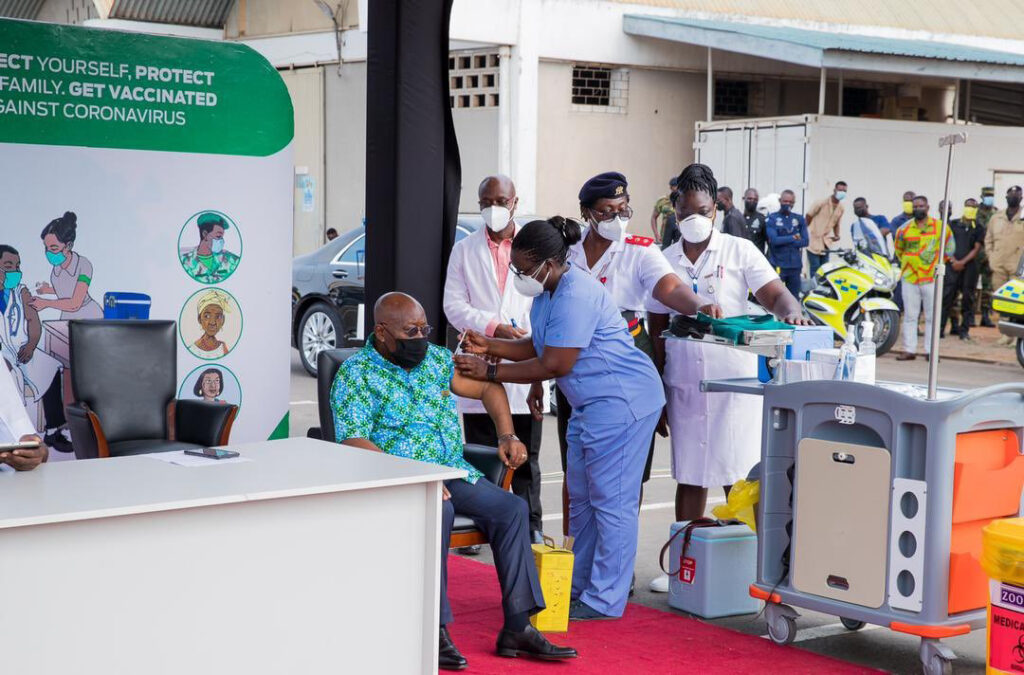ADF STAFF
African nations have begun to administer free COVID-19 vaccines through COVAX, the global plan to equitably distribute the shots.
Prominent politicians, security personnel and front-line health care workers were among the first recipients of the vaccines.
In Ghana, which received more than 500,000 doses of the AstraZeneca vaccine developed in the United Kingdom, President Nana Akufo-Addo and first lady Rebecca Akufo-Addo received two of the first shots in early March.
“It is important that I set the example that this vaccine is safe by being the first to have it so that everybody in Ghana can feel comfortable about taking this vaccine,” Akufo-Addo said during a live broadcast.
Akufo-Addo has said Ghana plans to vaccinate 20 million people, or more than two-thirds of its population, by the end of the year.
Bernice Anaglatey, 42, who works in the COVID-19 intensive care unit at Accra’s Ridge Hospital, welcomed the shot.
“I feel so good about taking the vaccine,” Anaglatey told Reuters. “It will protect me from contracting the virus from patients.”
Côte d’Ivoire also received more than 500,000 doses of the AstraZeneca vaccine through COVAX. Medical personnel, teachers and security force members are being vaccinated first. Jean-Marie Vianney Yameogo, the country’s World Health Organization (WHO) representative, said the delivery of vaccines by UNICEF highlighted the international partnership to ensure vaccine equity.
The vaccines are distributed with help from Gavi, the Vaccine Alliance, and the Coalition for Epidemic Preparedness Innovations.
“Vaccines save lives. As health workers and other front-line staff are vaccinated, we will see a gradual return to normal, especially for children,” Marc Vincent, UNICEF representative in Côte d’Ivoire, said in a story on the United Nation’s website. “In the spirit of universal health coverage, we must leave no one behind.”
Nigeria, home to about 200 million people, received 3.94 million AstraZeneca doses, the first delivery of 16 million doses it expects to receive through COVAX. Health care and front-line workers were the first to be inoculated.
Peter Hawkins, country representative for UNICEF, told Al-Jazeera that there still was a long way to go in fulfilling “our obligations to the people of Nigeria.”
“But close to 4 million is a big amount,” Hawkins said. “It’s a fantastic step forward for Nigeria and a fantastic step forward for the whole of Africa, and people will take them. There is no question about that.”
Other COVAX shipments to African nations in early March included 1.7 million doses to the Democratic Republic of the Congo, more than 1 million to Kenya, 624,000 to Angola, 36,000 to The Gambia and 324,000 doses to Senegal, Reuters reported.
“This is a historic and momentous occasion for The Gambia,” Health Minister Ahmadou Lamin Samateh said in a statement.
Kenya’s shipment was the first part of a 3.56 million vaccine allotment from COVAX. The country plans to vaccinate 1.25 million people by June, starting with health care and other essential workers, and another 9.6 million in the next phase.
Patrick Amoth, director general at the Ministry of Health, was one of the first to receive the shot.
“I am feeling great,” Amoth told Reuters. “The vaccine is safe.”
As other countries received the AstraZeneca shots, Rwanda became the first African nation to receive the U.S.-developed Pfizer vaccine — about 103,000 doses — through COVAX. Rwanda, which plans to vaccinate 30% of its population this year, also received about 240,000 AstraZeneca shots.
The country has installed special infrastructure so it can store the vaccines at minus 70 degrees Celsius.
“These doses of COVID-19 vaccine from the COVAX facility represent an unprecedented global effort to have equitable access to COVID-19 vaccines,” Dr. Mwinga Kasonde, the country’s WHO representative, told Taarifa, a Rwandan newspaper.

